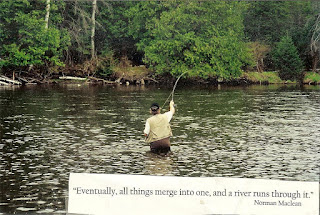Dearly Beloved mother, children, and friends of my friend
Chris Nunn. It grieves me not to be present with you as Chris was a friend who
deserves the highest possible honors and the greatest measure of respect. He
would understand, as I hope you do also, that my prior commitment to preside at
a wedding has to be precedence.
Chris taught me a lot about fishing and hunting, and
every time I wade into the Au Sable or some other stream I am listening in my head
to his running commentary on water conditions, what bugs are hatching, or some
fish he had caught in that particular spot at some time in the past. Sometimes
I could barely believe what he was saying- like the time he took me on a back
road somewhere Up North and stopped his truck at a place where a small stream
ran under the road through a metal culvert about 8 feet in diameter. Chris put
a night crawler on a small hook at the end of my line and told me to let it
drift down stream into the darkness under the road. Of course, within a few
seconds I had caught a 9” brook trout.
How had Chris discovered this unlikely fishing spot? It
seems he spent every waking moment on the lookout for places where brook trout,
or pheasants, or grouse, or steelhead might congregate, places no one else
would ever dream of.
Another such place was on the Black River, where Chris
took his Dad and I one winter day in search of steelhead. Chris parked by a
sign that read, “No trespassing. No Fishing.” “Don’t worry,” Chris assured us
before heading off through the woods, “I know the guy”. Larry and I set off on
a different path, looking for a place to access the river. After we had walked
awhile a stranger came running through the woods behind us. “You guys are under
arrest for trespassing and resisting arrest.” Resisting arrest? Larry explained
that his son “knew the guy”, and the man said, “I AM ‘the guy’, and I have
given permission to no one.” I guess he realized we were harmless because all
he did was walk us back to the truck and then drive away. When Chris emerged
from the woods he said, “what was all that about?” We told him it was part of
his plan to get his father and his priest locked up.
That wasn’t really a plan on his part, but he DID try to
pull a trick on Larry and the other old time hunters on opening day of pheasant
season a number of years ago. On the night before opening day he called to tell
me that he had purchased some farm-raised pheasants and released them in the
field where we would be hunting the next morning. “Don’t tell my dad,” he said,
“I want to hear what they have to say about “the birds are coming back almost
like they used to be in the 1940’s”. Sure enough, the next morning the dogs
were flushing an unusual number of pheasants as we walked across the field, and
Larry was commenting about it and making reference to 1941 or 1942 when a
pheasant flushed right in front of us, but before either Larry or I could raise
our guns the dog jumped up and caught the bird in his mouth! “That is not a
wild bird, “ Larry announced, “Chris, did you put tame pheasants in this
field”? So the truth was out.
So Chris taught me a lot about hunting and fishing, but
he also taught me about heaven. I don’t mean a place up in the sky, but as in
“thy kingdom come on earth as it is in heaven,” I mean when life is as it
should be, and the walls that separate us are finally broken down. It seems
Chris was always trying to organize the most epic of all fishing trips, an
expedition to the most perfect fishing spot involving all the people he liked
to fish with. One such place he talked about was a nameless stream somewhere in
Canada where, he said, we would hitch a ride on a freight train through the
wilderness and have them stop the train to let us off beside a bend in that
stream, and we would camp there and fish for days until the train came back.
“Jon”, he said with intense conviction, “those brook trout are 18” long!” That
trip was too ambitious and too long for me to undertake, but I have formed a
mental image of that place, where the brook trout are huge and a river runs
through it. Now, of course, my mental image includes Chris, stirring up the
campfire and watching for the rest of us to arrive. Larry is already there with
him.
We don’t have to search for that place in the wilds of
Canada because we are already there. In one place in his writings St. Paul
wrote, “nothing can separate us from the love of God in Jesus Christ our Lord.”
Neither height nor depth, time nor eternity, sickness nor even death can
separate us from the love that Chris made known to us as a parent, a son, an
outdoorsman, and a friend.
Thanks for letting me be a part of your gathering today.
“Into your hands, O Lord, we commend your servant Chris. Acknowledge, we humbly
beseech you, a sheep of your own fold, a lamb of your own flock, a sinner of
your own redeeming. Receive him into the arms of your mercy, into the blessed
rest of everlasting peace, and into the glorious company of the saints in
light. Amen.”
Sent from my iPad


